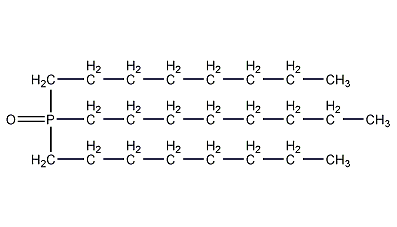
Structural formula
| Business number | 01N4 |
|---|---|
| Molecular formula | C24H51OP |
| Molecular weight | 386.63 |
| label |
trioctylphosphine oxide, Trin-octylphosphine oxide, Tri-n-octylphosphine oxide, Tri-n-octylphosphorus oxide, trioctyl phosphorus oxide, Trioctylphosphine oxide/phosphorus, Cyanex 921, Topo, Tri-n-octylphosphine oxide, Tri-n-octylphosphinoxide, Trioctylphosphine oxide, [CH3(CH2)7]3PO |
Numbering system
CAS number:78-50-2
MDL number:MFCD00002083
EINECS number:201-121-3
RTECS number:SZ1662500
BRN number:1796648
PubChem number:24853374
Physical property data
1. Appearance: white odorless crystalline powder
2. Density (g/mL, 20℃) 0.88
3. Relative vapor density (g/mL, air =1): Undetermined
4. Melting point (ºC): 52-57
5. Boiling point (ºC, normal pressure): Undetermined
6 . Boiling point (ºC, 0.3mmHg): 212-213
7. Refractive index (n20/D): Undetermined
8. Flash point (ºC): 252
9. Specific optical rotation (º): Undetermined
10. Autoignition point or ignition temperature (ºC): Undetermined
11. Vapor pressure (mmHg, 40ºC): Undetermined
12. Saturated vapor pressure (kPa, 39ºC): Undetermined
13. Heat of combustion (KJ/mol): Undetermined
14. Critical temperature (ºC): Undetermined
15. Critical pressure (KPa): Undetermined
16. Log value of oil-water (octanol/water) partition coefficient: Undetermined
17. Explosion upper limit (%, V/V): Undetermined
18. Explosion lower limit (%, V/V): Undetermined
19. Solubility: insoluble in water
Toxicological data
1. Skin/eye irritation
Standard Draize test: rabbit, skin contact: 500μL/24H, severity of reaction: moderate.
Standard Draize test: Rabbit, eye contact: 100mg/24H, severity of reaction: severe.
2. Acute toxicity: Rat oral LD50: >10mg/kg; rabbit skin contact LD50: 2830mg/kg.
生�Academic data
Not harmful to water.
Molecular structure data
1. Molar refractive index: 120.11
2. Molar volume (cm3/mol): 448.8
3. Isotonic specific volume (90.2K ): 1059.0
4. Surface tension (dyne/cm): 30.9
5. Polarizability (10-24cm3): 47.61 p>
Compute chemical data
1. Reference value for hydrophobic parameter calculation (XlogP): 9.6
2. Number of hydrogen bond donors: 0
3. Number of hydrogen bond acceptors: 1
4. Number of rotatable chemical bonds: 21
5. Number of tautomers: none
6. Topological molecule polar surface area 17.1
7. Number of heavy atoms: 26
8. Surface charge: 0
9. Complexity: 266
10. Number of isotope atoms: 0
11. Determine the number of atomic stereocenters: 0
12. Uncertain number of atomic stereocenters: 0
13. Determine the number of chemical bond stereocenters: 0
14. Number of uncertain chemical bond stereocenters: 0
15. Number of covalent bond units: 1
Properties and stability
Reacts with strong oxidants.
Storage method
Store airtight in a cool, dry place.
Synthesis method
None yet
Purpose
Organic solvents. Extracting agent.

 微信扫一扫打赏
微信扫一扫打赏

